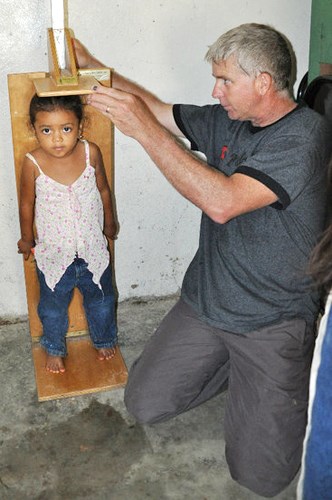A group of Weyburn Church of Christ members travelled with other missionaries to Honduras recently to do God's work and answer the question: "what is really necessary in life?"
Husband and wife Lowell and Darla Peterson, along with three of their children, Brooke aged 19, Starlet aged 16 and Karina aged 13, travelled with friend Judy Severson to the eastern city of Catacamus, Honduras from August 3 to 13. The group travelled with missionaries from the Church of Christ in Detroit, organized by Peter Brazle, a former Weyburn resident whose father, Clinton Brazle, was a gospel preacher for 30 years in Weyburn.
"We've always wanted to do a missionary trip with our children," said Lowell.
Lowell recently returned from a missionary trip to Haiti soon after a 7-magnitude earthquake devastated the country in January.
The group began their trip in the mountains of Catacamus, where health care access is unattainable for most of its impoverished residents. They assisted the few health care workers available by recording the general health of the population, including checking for lice, performing eye charts and hearing tests, and recording their height, weight and birth date.
"In the mountains they didn't have health care and education," said Brooke. "In the city they didn't have food or clothes - the needs were different."
The group also supplied some hygiene products to the people they visited, giving demonstrations as needed.
"We gave them toothpaste and toothbrushes and showed them how to use them because they had never used them before," said Lowell.
The missionaries visited two schools in Catacamus, where access to education was difficult for many of the people living in poverty.
"In the first school we visited we met someone who walked three hours to get there," said Darla.
They also went to the Good Samaritan School, where underprivileged students were being sponsored by North Americans to cover the costs of uniforms and tuition.
"They were so happy to see the Gringos, as they called us," laughed Darla.
During a visit to an orphanage, the group made crafts with the children and even threw a party.
"They didn't usually get to eat pizza and pop so we had a pizza party," said Brooke. "They really liked it."
One of the most memorable moments for the group from Weyburn was a visit to the Handicap Home, where disabled children, many orphans, had been sent because their families could not afford to care for their special needs.
"We did paintings and stencilled on the walls, repaired cribs and sanded and painted them," said Judy.
"And loved on the kids," added Darla.
"That's what was most needed," agreed Judy.
The Weyburn group, as well as the Detroit group, brought money collected through their local church and co-workers to distribute to those living in poverty in Catacamus. A Honduran church helped the group determine which residents had the greatest need.
"One family had had a fire and we bought them supplies to rebuild their roof," said Lowell.
They also bought basic food staples such as flour, rice and beans to distribute to the poverty stricken Hondurans.
Lowell said he was proud of his girls for learning to live on so little during the two-week trip.
"We bought some bread and it had a bug in it and Karina just took it out and kept on eating," recollected Lowell.
Both the girls and the adults said they learned valuable life lessons from their trip.
"It was a real culture shock," said Brooke. "Things I was so thankful for when I got home were health care and hospitals."
"One thing that challenged us on this trip is 'what is necessary for life?' - health care, education and the Lord." said Lowell.
Lowell admitted that, in a way, he was jealous of the simplicity of the Hondurans' lifestyle, despite their poverty. He said the trip forced everyone in the group to re-examine what poverty is.
Judy agreed, "Life was so simple," she said. "They didn't have luxuries like running water but they seemed so happy and were so kind to us."
Lowell said the trip was a practical way to let God work through them to help others.




